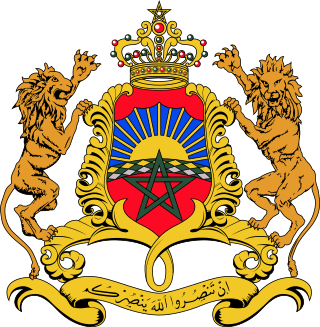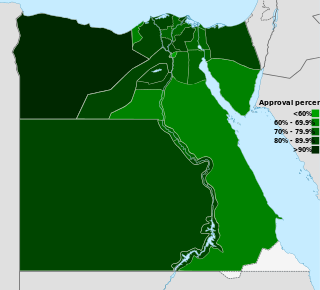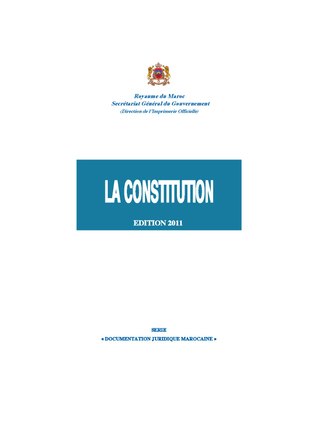A constitutional amendment is a modification of the constitution of a polity, organization or other type of entity. Amendments are often interwoven into the relevant sections of an existing constitution, directly altering the text. Conversely, they can be appended to the constitution as supplemental additions, thus changing the frame of government without altering the existing text of the document.

The Riigikogu is the unicameral parliament of Estonia. In addition to approving legislation, the Parliament appoints high officials, including the prime minister and chief justice of the Supreme Court, and elects the president. Among its other tasks, the Riigikogu also ratifies significant foreign treaties that impose military and proprietary obligations and bring about changes in law, as well as approves the budget presented by the government as law, and monitors the executive power.
In Australia, referendums are public votes held on important issues where the electorate may approve or reject a certain proposal. The term is commonly used in reference to a constitutional referendum which is legally required to make a change to the Constitution of Australia.
The 1919 Australian referendum was held on 13 December 1919. It contained two referendum questions. The referendums were held in conjunction with the 1919 federal election.

Malta elects on a national level 6 MEPs representing Malta in the European Parliament, on a district level the legislature, On a local level the Local Councils and on a community level the Administrative Committees.

The Council of Representatives, usually referred to simply as the Parliament, is the unicameral legislature of the Republic of Iraq. According to the Constitution of Iraq, it is the lower house of the bicameral legislature of the country. As of 2020, it comprises 329 seats and meets in Baghdad inside the Green Zone.

A four-question referendum was held in Belarus on 14 May 1995, alongside parliamentary elections. The four issues were the possibility of giving the Russian language equal status with Belarusian, whether new national symbols should be adopted, whether there should be economic integration with Russia and changes to the constitution that would allow early elections if Parliament systematically violated the constitution. According to official results, all four were approved by at least three-quarters of voters, with a turnout of 64.8%.

A nationwide referendum was held in Moldova on 5 September 2010 on whether or not the country should amend the Constitution of Moldova to return to direct popular election of the president. Since 2001, the president had been indirectly elected by Parliament, with a supermajority of 61 seats required for election. The voters are asked to answer the following question: "Would you agree with the Constitutional amendment, which would allow the election of the President of the Republic of Moldova by the entire population?" Voters chose one of the proposed options: "Yes (for)" or "No (against)". Of those who had cast their vote, 87.83% chose "Yes". However, the referendum did not pass because only 30.29% of voters turned out, short of the necessary 33% for the referendum to be considered valid.

Parliamentary elections were held in Morocco on 3 June 1977. Elections had previously been held in 1970, but Parliament had been dissolved in March 1972 and a new constitution approved in a referendum in the same month. Fresh elections were scheduled for May, but were later indefinitely postponed.

A constitutional referendum was held in Morocco on 24 July 1970. The new constitution replaced that approved by referendum in 1962, but suspended by King Hassan II in 1965 following riots in Casablanca. It was approved by 98.8% of voters, with a 93.2% turnout. Following its approval, fresh elections were held on 21 August.

A constitutional referendum was held in Morocco on 23 May 1980. The referendum asked whether voters approved of changes to article 21 of the 1972 constitution, which concerned the Regency Council, and reduced the age of majority for the King from 18 to 16. The changes were approved by 99.6% of voters, with a 96.8% turnout. A second referendum was held a week later on articles 43 and 95.

A constitutional referendum was held in Morocco on 30 May 1980. The referendum asked whether voters approved of changes to articles 43 and 95 of the 1972 constitution, which would extend the mandate of Parliament from four to six years. The changes were approved by 96.7% of voters, with a 90.8% turnout.

A referendum on extending the parliamentary mandate was held in Morocco on 1 December 1989. As elections had been held in 1984, the six-year term for Parliament due to expire in 1990. The decision was approved by 100% of voters, with a 98.8% turnout.

A constitutional referendum was held in Morocco on 4 September 1992. The amended constitution increased the number of seats in the Parliament from 306 to 333, with the number of directly elected seats rising from 204 to 222. It also allowed the Prime Minister to appoint the rest of the cabinet, and for legislation to be promulgated a month after being passed by the Parliament, regardless of whether the monarch had given assent. The changes were approved by 99.96% of voters, with 100% voting in favour in major cities and three of the four provinces in the disputed territory of Western Sahara. Voter turnout was reported to be 97.29%. Fresh elections were held the following year.

A constitutional referendum was held in Morocco on 13 September 1996. The new constitution created a bicameral Parliament by adding the Assembly of Councillors to the existing Assembly of Representatives. The 270-seat Assembly of Councillors would be indirectly elected by local councillors, chambers of commerce (81), and trade unions (27), whilst the 325-seat Assembly of Representatives would now be entirely directly elected. The changes were approved by 99.5% of voters, with an 85% turnout. Fresh elections were held the following year.

A constitutional referendum was held in Egypt on 19 March 2011, following the 2011 Egyptian revolution. More than 14 million (77%) were in favour, while around 4 million (23%) opposed the changes; 41% of 45 million eligible voters turned out to vote.

A referendum on constitutional reforms was held in Morocco on 1 July 2011. It was called in response to a series of protests across Morocco that began on 20 February 2011 when over ten thousand Moroccans participated in demonstrations demanding democratic reforms. A commission was to draft proposals by June 2011. A draft released on 17 June foresaw the following changes:

Early general elections were held in Morocco on 25 November 2011, brought forward from 2012 and then postponed from 7 October 2011.

The Constitution of Morocco is the supreme law of the Kingdom of Morocco. The constitution defines Morocco as a constitutional monarchy and lays out the fundamental rights of Moroccan citizens, it also defines the basis and structures of government, the council of ministers, and the parliament.
A referendum is a direct vote in which an entire electorate is asked to either accept or reject a particular proposal. This article summarises referendum laws and practice in various countries.








